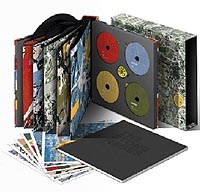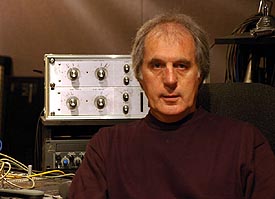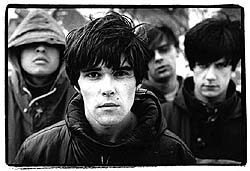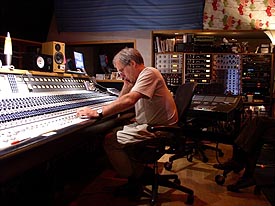 John Leckie (Stone Roses - Producer)
John Leckie (Stone Roses - Producer)
'Master Producer'
How good a record producer is John Leckie? Well, if you take a look at ‘Q Magazine Readers’ 100 Greatest Albums Ever’ you will see that he has produced albums numbers two and six. That’s two albums in the top six. That’s impressive. He also engineered No. 30 ‘Wish You Were Here’ for Pink Floyd, and produced No.74 ‘Origin of Symmetry’ for Muse.
John Leckie could easily be described as the last of the super producers. That breed of men that appears on every bands list of producers they’d like to work with. Mentioned in the same breath as George Martin, Butch Vig, Steve Albini and the idiosyncratic Phil Spector, Leckie has worked with an impressive list of artists and albums that spans nearly forty years of extraordinary work.
He started as a tape operator at Abbey Road for individual Beatles projects. Now, thirty years later, Leckie is perhaps best known for his production work on three classic, million selling albums: Radiohead’s ‘The Bends’, Muse’s ‘Origin of Symmetry’ and the Stone Roses eponymous first album.
Now re-released as a sumptuous box set, ‘Stone Roses’ is considered a modern classic. This seminal album is now available in four packages; which will include: lost demos, a rare live DVD, artwork from John Squire, home video, promo videos and remastered vinyl.

Chatting one-on-one with the man himself, I first asked John if he knew when he was recording the album, that it would be so important? [Leckie] "Well, what can I say? Every record I produce I want to be as excellent as possible. Of course, you want every record you make to be number one, and to be heard by millions, that’s just part of the job really. But I didn’t expect to be talking about it twenty years later."
What is it about the record that people really like? "The singing and the songs probably: the sound and details of it. Also, the general vibe, sway and groove of the thing. Also, the people who like it grew up with it. People always have their favourite records from their teenage or their twenties or their college years. Obviously there was a big burst when it first came out with that Stone Roses mania thing. There were a lot of people listening to music at that time. Music meant a lot because not only was it the music but it was the characters in the band, the clothes, what they were saying. They had their own style. You could see that coming, the Baggy movement, it was quite different between London and Manchester at that time…in terms of ‘The width of trouser’."
Has anyone ever mentioned the similarity between the sounds of the Stone Roses with that of mid-Sixties psychedelia? "I wouldn’t say they aimed for that sound. The intention was to back off it sounding too sixties – very often they turned away from that. Songs like Mersey Paradise and Sugar Spun Sister were Byrds-like and they were probably inspired by that era but it’s not a sound they were after at all."
How did you get your start at Abbey Road? "I worked for a couple of film companies in the West End of London in the dubbing theatre and I just wrote letters to some of the big studios like, Decca and EMI, and Abbey Road were the only people to give me an interview. I was very lucky, and I got in just as Air studios were starting, so some of the engineers, like Geoff Emerick, had gone to Air studios and to Apple, so there were some vacancies, so that’s why I got the job really."

How were the Stone Roses to work with? "They were great. Not without problems of course, but always positive. It was a kind of party atmosphere but in the background there was discipline because there was a finite amount of time. Nobody said ‘take as long as you like lads’, it was a job to be done, that was kind of the vibe, it wasn’t total freedom. Sometimes the time restriction works in a positive way. They’d been in a studio before; they knew what would work and what wouldn’t work. They wanted and expected a good sound. They were happy to spend six hours getting the bass sound right. They didn’t necessarily know what they wanted, but they knew what they didn’t want. They had a lot of suggestions and ideas and they had a firm idea where they wanted their sound to go."
"It wasn’t really a struggle; it was an enjoyable record to make. It was made over a period of time, it wasn’t ‘go in the studio for two weeks and don’t come out to you’re finished’. In fact, we did it in spits and spurts. We went up to Rockfield studios, did some mixing at Konk and more recording at Abbey Road and Battery. We used a circle of studios over a three month period."
The release is billed as ‘a fully remastered version of the UK album by original producer John Leckie and Ian Brown’, what did that involve? "It involves taking the stereo tape, which is the mix, we are not remixing the recording, but just taking the stereo mix and taking away any reductions or enhancements that were done on the original mastering when it was put onto vinyl."
"So it is completely flat and whatever is on the tape we would start listening to and make decisions based on what is happening in audio today and making it sound as good as we can with today’s equipment. It might mean a bit more treble, a bit less bass, turn something up, little things like that. It’s not a very difficult job. It’s just going back to the original recording and trying to make it as pure as possible, and it does sort of bring things to life: the accent is on a different thing. One thing we did do was to make it louder, because commercial CDs are louder, so we had to push the volume up."

Can you tell me about John Leckie’s personal home video “Up at the Sawmill: The Making of ‘Fool’s Gold’” that comes with the Collector’s Edition? "It’s just that I’ve always had an interest in camcorders; it was one of those big, full-size VHS recorders. For years I had this film on the end of a piece of tape. There was about 30 minutes; some of it was a bit boring, film of us fishing in the river, but it was good fun actually. It was only a casual thing; I didn’t film everyone I recorded. It was just us doing ‘Fools Gold’ at Rockfield. We were just looning about really, there’s no profound statement."
How would you describe a John Leckie production? "I provide a full service," he laughs. "I’ve been doing it for a long time so I bring a lot of experience. I don’t choose who I work with but people come to me to make records."
You have worked with many different artists, who was your favourite? "Of the records I’ve done I have to say that XTC were the most memorable, musical and enjoyable. It was ground breaking stuff. Everytime I worked with Andy Partridge it was great fun. They were a great band; we should get them back together."
With the increase in home computer-based recording, is the role of the producer becoming a lost art? "Sadly I’d say yes. Because now everyone can be a producer, on their laptop, on their desk or in their bedroom. But what they can’t do is take a band that’s touring and take them in the studio and make a record within the time constraints and that is on budget and keep everyone happy and get a great sound. That’s what a producer does, he produces records."
Interview by Peter ‘taB’ Walker
/www.thestoneroses20.com
www.legacyrecordings.com
Back To Archives

